Key takeaways:
- Social media anxiety often stems from comparison, unrealistic expectations, and the compulsive need for validation through likes and comments.
- Establishing personal boundaries, such as muting negative accounts and setting time limits, helps manage anxiety and promotes a healthier online environment.
- Practicing mindfulness, including deep breathing and journaling, can enhance self-awareness and reduce the emotional impact of social media interactions.
- Finding support through community, therapy, and resources like books and podcasts can provide valuable strategies for coping with social media anxiety.
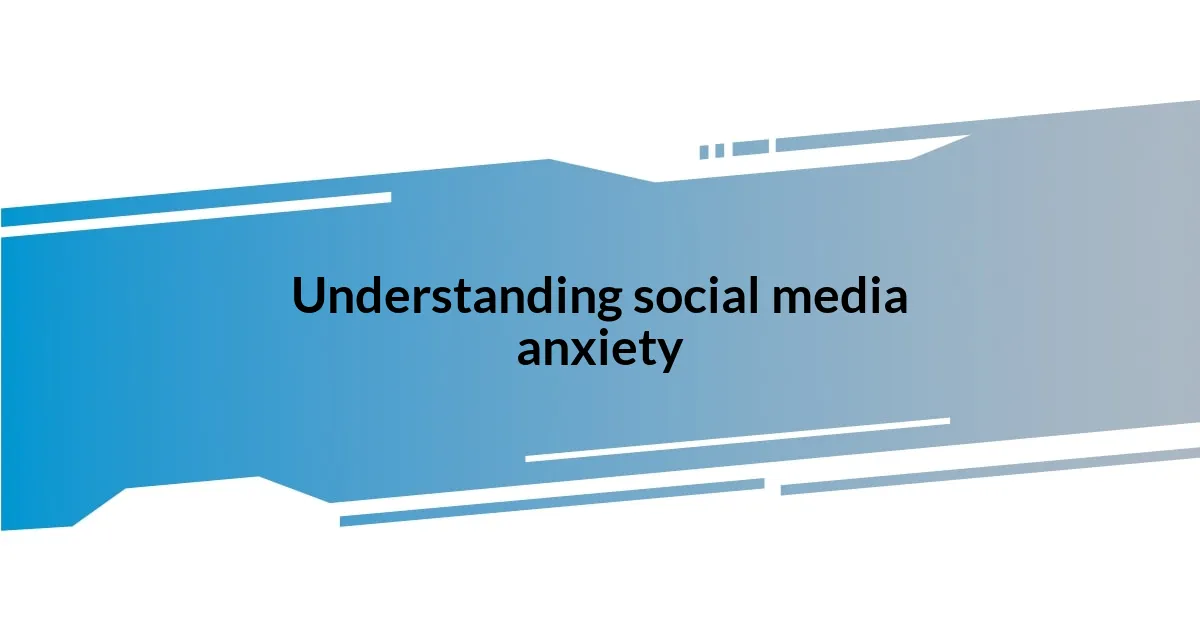
Understanding social media anxiety
Understanding social media anxiety often means recognizing the constant pressure to present a curated version of ourselves online. I remember scrolling through Instagram, feeling overwhelmed by carefully styled posts and perfect lives, which made me question my own experiences. Have you ever felt that gnawing insecurity when comparing yourself to others?
This anxiety can manifest in various ways, from fear of missing out (FOMO) to the paralyzing worry about receiving validation through likes and comments. I often found myself refreshing my notifications, hoping for affirmation from friends, yet feeling emptier with each scroll. Why does a little red dot hold so much power over our emotions?
Moreover, it’s essential to acknowledge that social media platforms can create a false sense of connection while simultaneously isolating us. I once participated in a group chat that seemed lively, but I still felt profoundly alone as the conversations drifted deeper into personal updates. Can you relate to being surrounded by people yet feeling distant in such a connected world? Understanding this dissonance is the first step toward managing the anxiety that comes with our digital interactions.
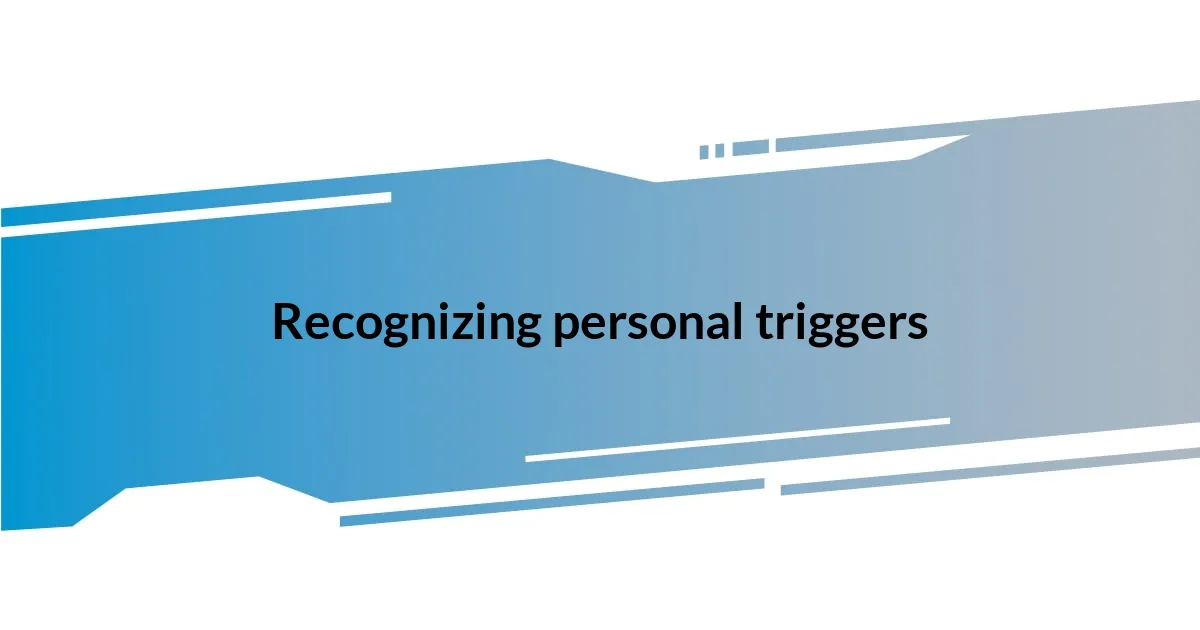
Recognizing personal triggers
Recognizing personal triggers in social media can be a game-changer for managing anxiety. For me, it was those quiet moments scrolling through my feed late at night that weighed heavily on my mind. I would often catch myself feeling increasingly anxious, especially after viewing posts that seemed too perfect or too glamorous. It was as if I was setting myself up for disappointment, time and time again.
Understanding what specifically triggers my anxiety allows me to create boundaries and navigate my social media use more thoughtfully. Here are some common triggers I’ve identified:
- Comparison: Watching friends or influencers showcase their “perfect” lives can spark feelings of inadequacy.
- News Overload: Constant exposure to alarming headlines can induce stress and anxiety about the world.
- Unfollows or Ignoring: I noticed that when someone who used to interact with me suddenly stopped, it left me questioning my worth.
- Negative Comments: Encountering harsh criticisms or judgment on a post can cut deeply, heightening feelings of vulnerability.
- Unrealistic Expectations: The pressure to curate my own perfect image leads to anxiety whenever I feel my reality doesn’t match.
By paying attention to these triggers, I’ve learned to approach social media with a more mindful attitude, prioritizing what nourishes my spirit rather than drains it.
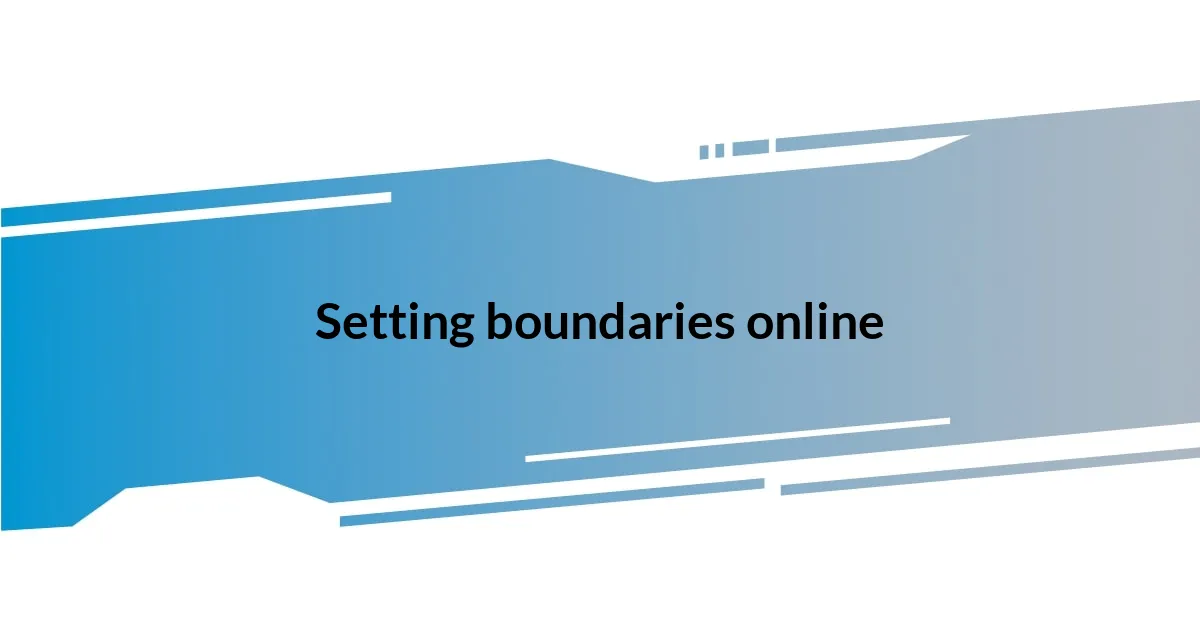
Setting boundaries online
Setting boundaries online has become essential in my journey to manage social media anxiety. I vividly recall a time when I decided to mute accounts that didn’t serve my well-being. It’s liberating to shift my digital landscape away from negativity, allowing me to cultivate a feed filled with inspiration instead. Have you ever considered how much control you actually have over your online environment?
In an effort to safeguard my mental health, I established strict time limits for my social media use. For instance, I designated “social media-free” hours during my evenings, where I focused on hobbies or spent quality time with loved ones. This allowed me to reconnect with the present moment, which felt refreshingly grounding. Setting these boundaries not only reduced my anxiety but also enhanced my overall well-being. Do you think you could carve out designated times for a break?
Ultimately, open conversations with friends about online boundaries have proven invaluable. When I shared my experiences and the boundaries I was setting, I found that many of my friends felt the same way. This mutual understanding has helped foster a supportive community. We often check in with each other, discussing our online habits and holding each other accountable. How impactful could it be for you to have a similar support system?
| Boundary Type | Personal Experience |
|---|---|
| Account Muting | Felt lighter and more inspired by curating my feed. |
| Time Limits | Increased focus on hobbies and relationships while reducing anxiety. |
| Sharing Boundaries | Created a supportive network that empowers accountability and understanding. |
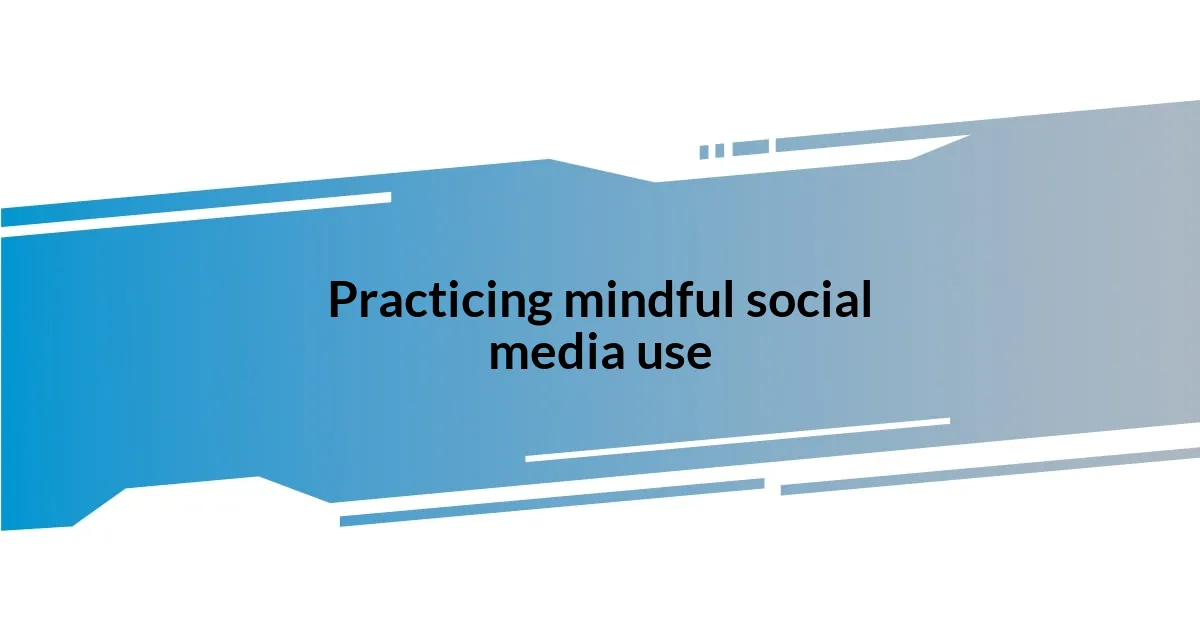
Practicing mindful social media use
Mindful social media use has transformed how I interact online. One evening, I caught myself mindlessly scrolling for nearly an hour, feeling increasingly agitated. It was a wake-up call. I started experimenting with techniques like setting aside specific times for social media, ensuring I was not just reacting, but intentionally engaging with content that adds value to my life. Have you ever noticed how being present can change your online experience entirely?
Breathing exercises have become a part of my routine before logging on. I take a moment to check in with myself—am I feeling anxious or excited? This self-reflection allows me to approach social media from a place of awareness, rather than letting it control my emotions. When I return to my feed with this mindful mindset, I find I’m less affected by the content I consume. Have you tried tuning into your emotions before scrolling?
Implementing a digital detox every now and then has also been instrumental for me. There was a weekend when I unplugged completely, and the clarity I gained was astonishing. I rediscovered activities I love and the joy of being fully present in those moments. When was the last time you gave yourself permission to disconnect from the digital world? It’s incredible how much deeper our world can feel when we step back from the screen.
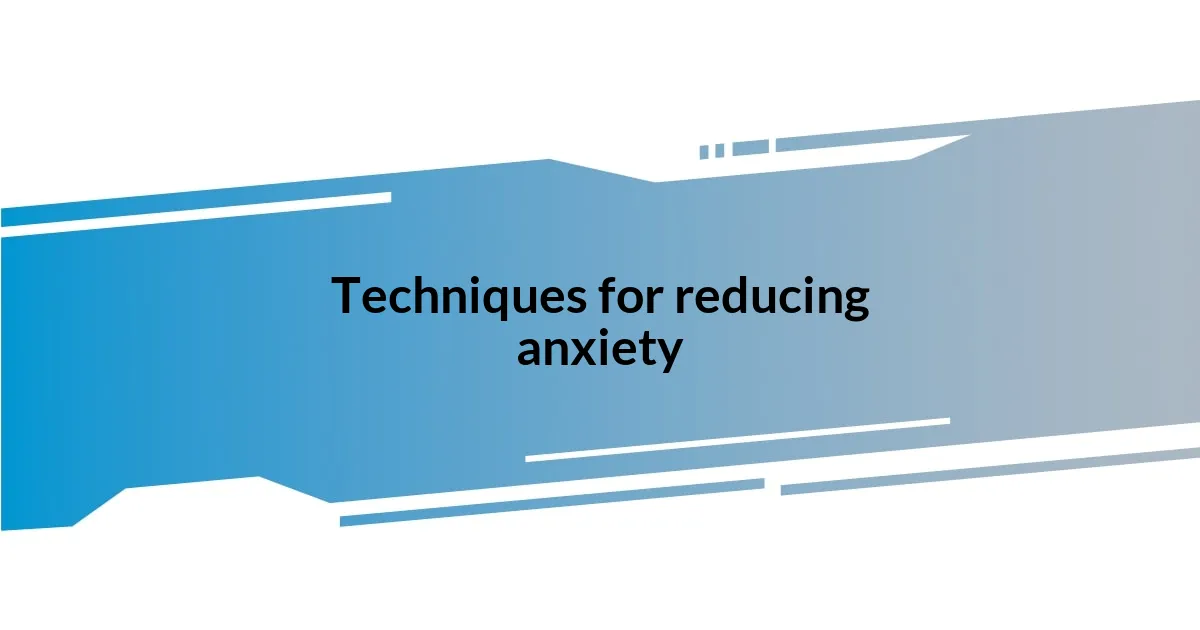
Techniques for reducing anxiety
One of the most effective techniques I’ve incorporated into my daily routine is practicing deep breathing. Before opening any social media app, I take a few moments to close my eyes and focus on my breath. This practice helps center my thoughts and allows me to step into the online space with a calm mindset. Have you ever tried to breathe deeply to regain control over your feelings? It might seem simple, but it truly transforms how I perceive my feed.
Journaling has also become a powerful ally in managing my social media anxiety. Each evening, I reflect on my online interactions, jotting down my feelings and thoughts about what I encountered that day. This practice not only clears mental clutter but serves as a reminder of what inspires or triggers me online. Do you think tracking your emotions could foster deeper self-awareness? I know it’s helped me identify patterns and set clearer boundaries for the future.
Engaging in offline hobbies is another technique that’s deeply impactful, one that I often turn to when I notice rising tension. I recall a weekend where I immersed myself in painting, completely disconnecting from the digital realm. The joyful focus on my craft was a welcome contrast to the noise online, reminding me of the fulfillment that real-world experiences can bring. When was the last time you indulged in something you love, away from screens? Finding balance like this has significantly reduced my anxiety levels.
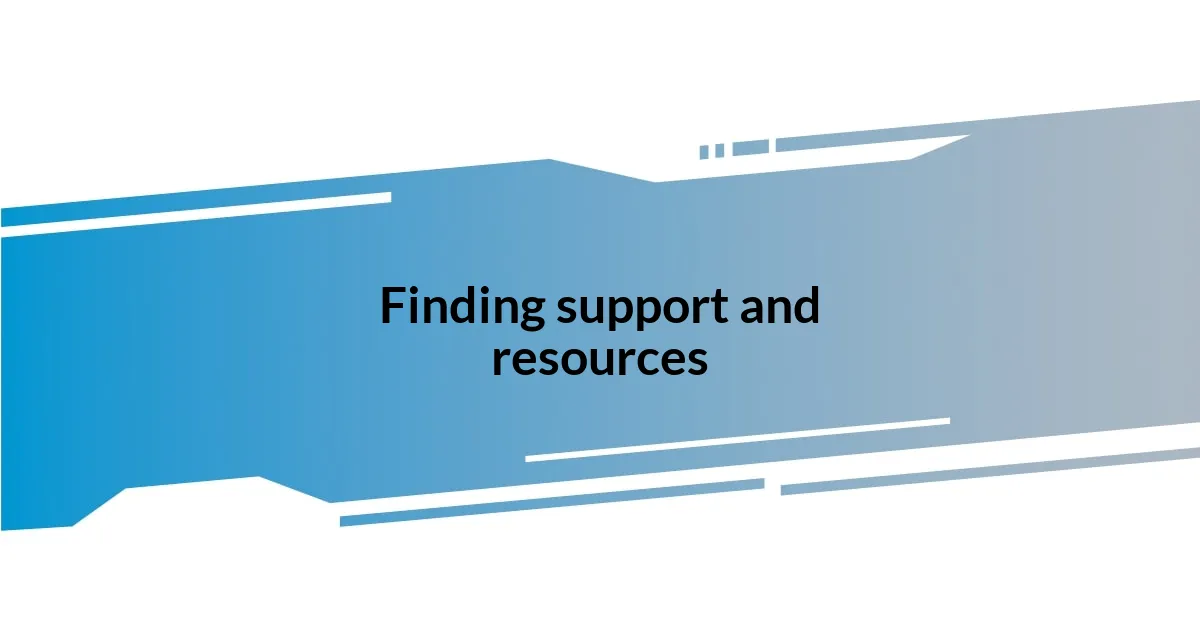
Finding support and resources
Finding support and resources can truly make a difference when navigating social media anxiety. I vividly remember the day I discovered online forums dedicated to this very issue. Connecting with others who shared similar experiences was like finding a lifeline. Their stories resonated with me, reminding me I wasn’t alone in feeling overwhelmed. Have you ever found comfort in a community that understands what you’re going through?
Counseling has also proven invaluable for me on this journey. I once worked with a therapist who specialized in digital wellness, and our sessions went beyond traditional talk therapy. We explored actionable strategies tailored to my specific challenges with social media. I realized how essential professional support can be—like having a personalized guide in a wilderness of anxiety. Have you considered talking to a professional about your experiences online?
Books and podcasts have become my go-to resources for additional support and insights. I recall listening to a podcast episode that centered on digital mindfulness—it opened my eyes to new ways of framing my online interactions. The host’s passion for cultivating a healthier relationship with technology inspired me to implement changes in my own life. Have you tapped into this wealth of knowledge available just a click away? Exploring these resources can provide tools and perspectives that empower you to reclaim your peace of mind online.
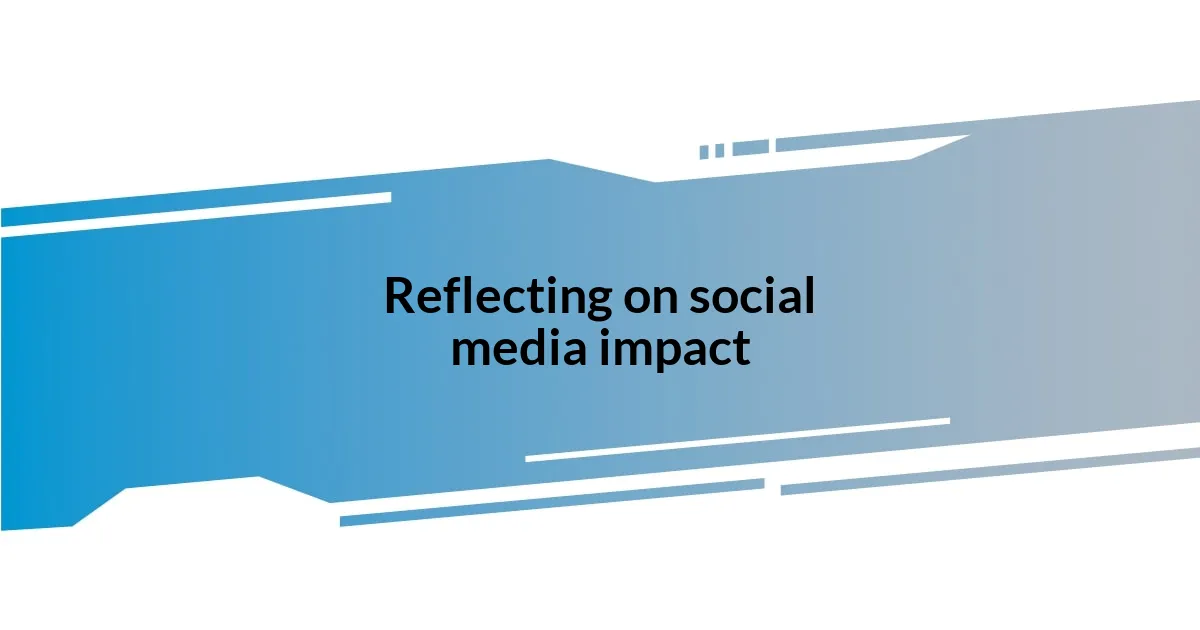
Reflecting on social media impact
Reflecting on the impact of social media on our daily lives often reveals layers of complexity. I remember a day when I scrolled through my feed and felt an unexpected wave of sadness wash over me. Witnessing highlight reels of others’ lives made me question my own journey. Have you ever had that moment when scrolling turned from entertaining to emotionally draining? It’s eye-opening to realize the subtle ways social media can influence our mood.
During my journey, I made it a habit to pause and assess how certain posts affected me. I recall a specific instance when a friend’s success story triggered feelings of inadequacy. After reflecting on it, I learned that comparison often thrives in the digital world, but it’s crucial to shield myself from those impulses. How often do you find yourself comparing your reality to someone else’s curated online narrative? This awareness has helped me unfollow accounts that trigger negativity, which ultimately fosters a more nurturing online environment for myself.
Overall, evaluating the messages social media sends is essential for our mental well-being. I’ve become intentional about curating my feed to prioritize positivity and inspiration. There was a time when mindless scrolling consumed me, but now, I actively seek out content that uplifts and motivates. Have you taken a step back to reflect on who or what fills your online space? The impact of social media can transform from anxiety-inducing to uplifting with mindful choices.